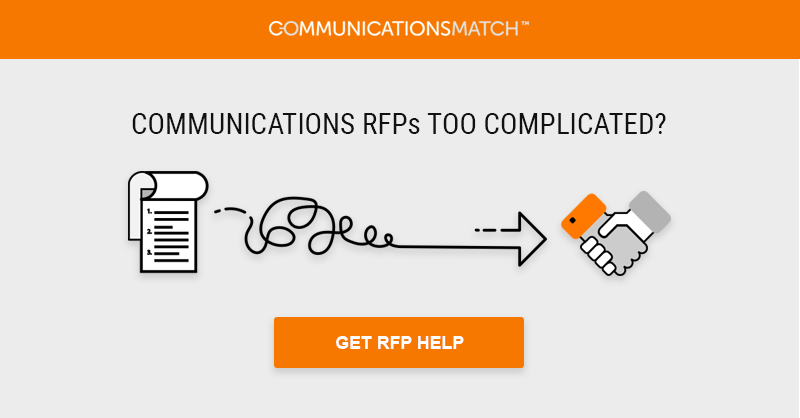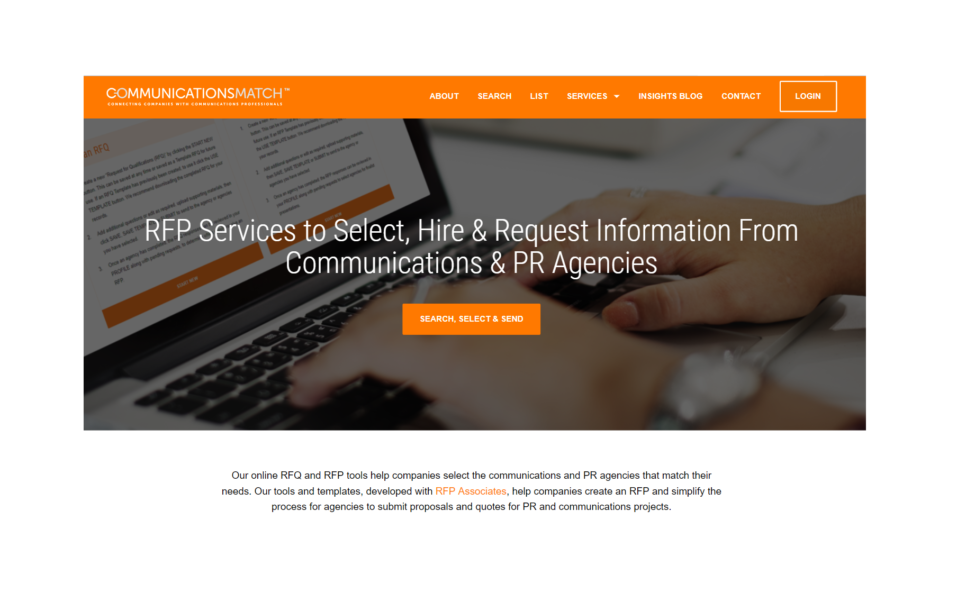PR RFPs: Time to Reinvent a Broken Process
 It’s no secret that most agencies hate receiving RFPs (requests for proposals). We also haven’t met business and corporate communications leaders who jump for joy at the prospect of issuing RFPs – traditionally a tedious, time-consuming process.Let’s be honest. It isn’t the RFP per se that bothers all parties (although a poorly written and incomplete RFP document certainly doesn’t help!). It’s the way the RFP process is implemented and the lack of response from agencies, that causes so much teeth-gnashing and cursing. (Read PR Week’s recent article: Why More Agencies Are Swiping Left on the RFP Process).
It’s no secret that most agencies hate receiving RFPs (requests for proposals). We also haven’t met business and corporate communications leaders who jump for joy at the prospect of issuing RFPs – traditionally a tedious, time-consuming process.Let’s be honest. It isn’t the RFP per se that bothers all parties (although a poorly written and incomplete RFP document certainly doesn’t help!). It’s the way the RFP process is implemented and the lack of response from agencies, that causes so much teeth-gnashing and cursing. (Read PR Week’s recent article: Why More Agencies Are Swiping Left on the RFP Process).
Communications Agency RFPs
But, the RFP process isn’t going away – and for several good reasons:First, most companies and other hiring entities - whether government agencies, non-profits, trade associations, or educational institutions – continue to believe in the importance of RFPs to the overall agency selection and hiring process.Second, no one has invented a better way to compare the capabilities and suitability of multiple professional services firms competing for a piece of business.Third, many organizations are required by policies or even governance rules to issue RFPs.
Agency RFP Process is Broken
That said, it is clear, that the current communications RFP process is broken. Here are five reasons commonly cited by agencies:
- It’s much more efficient to win business through referrals
- In a competitive RFP process – the odds of winning are low
- Many RFPs are rigged or are a fishing expedition
- Companies use RFP platforms not designed for communications searches
- Publicly posted RFPs are waste of time – unless you have an inside track
Given agencies’ experience with the RFP process, it should be no surprise that many simply decline to participate. This is a problem for companies that want to engage qualified firms.By declining to pursue RFPs on principle, agencies risk short-changing themselves and missing out on opportunities. While much needs to be fixed, we suggest agencies establish criteria for RFP participation and choose wisely.
Reinventing Agency RFPs
It is time to reinvent agency RFPs. This should start with the idea that companies/clients need to allocate to agency searches the same time and focus they would bring to hiring a new employee. As part of the discipline of ensuring the appropriate level of attention is given to hiring agencies, agencies should reject poorly produced RFPs.Here are other keys to making the process work:
Streamlined RFP Process
A structured, communications-focused approach, that draws on technology to allow companies to create, issue and compare RFPs online, offers the best path to simplifying the process. (Read “How to Improve the RFP Process” for more detailed overview):
Use Agency Search Tools to Cast a Wide Net
Technology-based agency search allows companies to identify agencies with skillsets that match needs and efficiently review them against specific search criteria.
Issue Agency RFPs or RFQs with Intent
Completing an RFP or RFQ (request for qualifications) takes time – a precious resource for agencies and companies – so each should only be issued to a limited number of agencies a company believes are qualified and have been fully-vetted to respond.
Use RFQs to Shortlist Agencies for RFPs
By issuing a simple, customizable online RFQ to selected agencies, companies can efficiently shortlist firms for a more comprehensive RFP. This helps filter out conflicts, verifies experience, and provides the opportunity to assess geographic, digital and other capabilities that may be important.
Issue & Compare Agency RFPs Using Communications-Focused Online Tools
Recognizing that responding to an RFP is a significant commitment of time for an agency, it is essential that they are only issued following a thorough review of credentials and with, as discussed, intent. Using communications-focused online tools (e.g. CommunicationsMatch RFPs) with forms that can be tailored for each project, to send, as well as, compare submissions, offers significant time savings for both clients and agencies. As an alternative, using an agency search consultant is an increasingly common option for companies.
CommunicationsMatch™ and RFP Associates’ RFP Process
CommunicationsMatch’s RFP tools, developed with RFP Associates, incorporate more than a decade of communications agency search expertise to streamline the agency search process.We start with the idea that RFQs, and especially, RFPs are issued following a search for agencies with the specific skillsets a company needs. Our online RFQs and RFPs are quick and intuitive – with the ability to customize, save forms, add supporting documents and send through the site to shortlisted firms. Responses can then be reviewed and compared in an admin panel, so finalists can be selected. To support the search process, we have developed a range of agency search resources.During the summer, the online RFP service is free for companies and agencies, and includes a complimentary consultation with our search experts. Find out more about our PR RFP tools. To start using the RFP tools, companies create a free search profile.
About the Authors
Simon Erskine Locke, Founder & CEO, CommunicationsMatch™Locke developed and launched CommunicationsMatch, an agency search and engagement platform with 5,000 listed firms and professionals in 12 countries, to help companies find and engage agencies, consultants and freelancers that match needs. A founder of communications agencies and startups, he previously headed communications functions at Prudential Financial, Morgan Stanley and Deutsche Bank. Steve Drake and Robert Udowitz founded RFP Associates in 2011 after observing the agency selection process from “both sides of the aisle” and recognizing the need to streamline and improve the way searches are made and agencies selected from an honest, unbiased approach. Over the course of their careers Robert and Steve have worked at agencies, corporations, and trade associations in New York, Washington, and, for Steve, in Beijing, China, where he opened Fleishman-Hillard's first Asian office. In recent years they have also been sole practitioners for a variety of clients seeking media, crisis, and strategic counsel. 